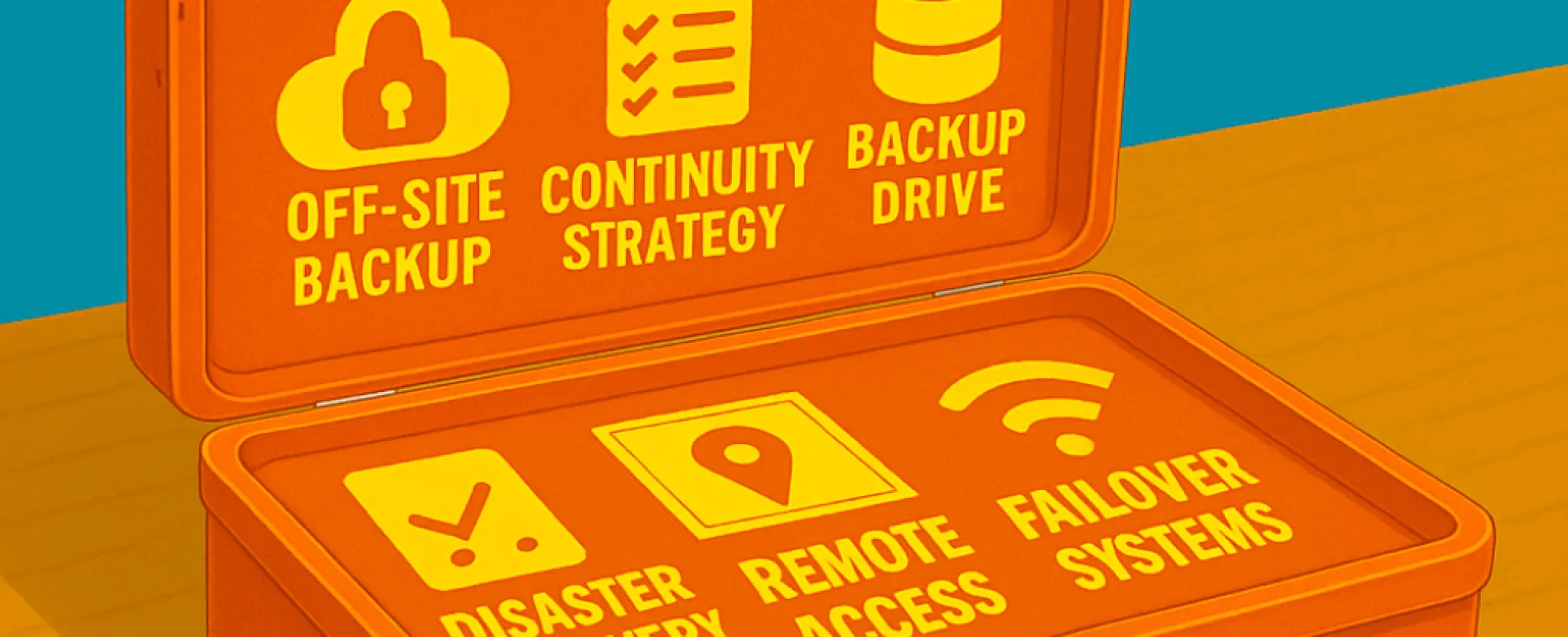July 28, 2025
Unexpected power failures, cyberattacks, hardware malfunctions, and natural catastrophes can strike without warning, causing severe disruption to small businesses. Many believe that simply having backups is sufficient, but restoring a file is only part of the solution. Without access to your systems, the ability to support remote work, and effective communication with your team and clients, even brief interruptions can lead to prolonged setbacks. A trusted IT partner should equip you not just with backups, but with a comprehensive strategy that ensures your business stays operational through any crisis.
Backups Alone Aren't Enough - You Need a Robust Continuity Plan
Backups are undeniably important, but they represent only one piece of the puzzle. What your business truly requires is a business continuity plan—a forward-thinking approach designed to maintain your operations during and after unexpected disruptions.
When systems fail, data becomes unreachable, or your physical office is compromised, relying solely on a local backup won't suffice. Without a clear, actionable plan to swiftly restore operations, your business faces significant risks including loss of revenue, damage to reputation, and regulatory non-compliance.
Understanding the Difference: Backups vs. Business Continuity
Many businesses confuse these concepts:
●
Backups enable data restoration.
●
Continuity ensures your business remains functional no matter the challenge.
A comprehensive continuity plan addresses critical questions such as:
●
What is our recovery time objective?
●
Where will our team operate if the office is inaccessible?
●
Which systems are essential for daily operations?
●
Who is responsible for initiating the recovery process?
Key elements of a solid continuity plan include:
●
Encrypted, off-site, and tamper-proof backups
●
Clearly defined recovery timelines (RTO/RPO)
●
Preparedness for remote work scenarios
●
Redundant systems and automatic failovers
●
Regular disaster simulation exercises
If your IT provider cannot confidently guide you through these critical aspects, you aren't truly protected—you've just been lucky so far.
Could This Happen to Your Business?
This is not just a scare tactic; these are real-world incidents with tangible consequences. Recent events include:
●
Florida hurricanes forced hundreds of businesses to shut down, leaving those without cloud access completely immobilized.
●
North Carolina floods wiped out on-site servers, erasing months of crucial data and invoices.
●
California wildfires destroyed entire office buildings in the Pacific Palisades, many lacking off-site recovery plans.
●
Numerous small businesses targeted by ransomware attacks have painfully discovered their backups were either corrupted or never properly tested.
Disasters don't discriminate by company size—they impact businesses like yours every day.
Essential Questions to Ask Today
If disaster struck tomorrow, would your business keep running?
Make sure to ask your IT provider:
●
How quickly can we recover from a ransomware attack?
●
Are our backups regularly tested and comprehensive?
●
What is the contingency plan if a flood or fire destroys our office?
●
Is our continuity strategy compliant with all relevant industry regulations?
●
Can we continue serving clients if our team must operate remotely?
If you don't have clear, confident answers, your business could already be vulnerable.
Disasters Are Inevitable. Downtime Is Optional.
You can't prevent every power outage, storm, or cyberattack, but you can control how your business responds.
A competent IT provider helps you bounce back.
An exceptional one ensures your operations never miss a beat.
Curious about your current preparedness?
Click Here or call us at 703-879-2070 to schedule your FREE 15-Minute Discovery Call, and let's safeguard your business against downtime caused by disasters.




